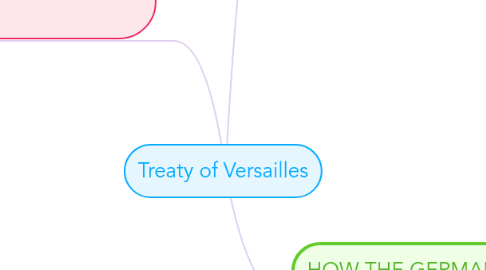
1. SIX TERMS OF THE TREATY OF VERSAILLES
1.1. Guilt
1.1.1. clause 231- Germany accepted blame ‘for causing all the loss and damage’ of the war.
1.2. Army
1.2.1. army: 100,000
1.2.2. no submarines
1.2.3. no aeroplanes
1.2.4. 6 battleships
1.2.5. Rhineland de-militarised
1.3. Reparations
1.3.1. £6,600 million – in instalments, until 1984).
1.4. Germany lost land
1.4.1. Alsace-Lorraine to France
1.4.2. Saar to France (15 years)
1.4.3. Malmedy to Belgium
1.4.4. North Schleswig to Denmark
1.4.5. West Prussia and Upper Silesia to Poland
1.4.6. Danzig a ‘free city’
1.4.7. Memel to Lithuania
1.4.8. German colonies became ‘mandates’ of the League of Nations.
1.5. League of Nations
1.5.1. set up.
1.6. Extra points
1.6.1. forbade Anschluss
1.6.2. Estonia, Latvia and Lithuania independent states.
2. AIMS OF THE BIG THREE
2.1. Georges Clemenceau, President of France
2.1.1. blamed Germany = punishment/ ‘hard justice’
2.1.2. angry = revenge.
2.1.3. wanted to ’make Germany pay’ for the Damage
2.1.4. threatened = wanted independent Rhineland/ get Alsace-Lorraine/
2.1.5. peace = wanted Germany weak and crippled
2.2. Woodrow Wilson, President of America
2.2.1. a better world ‘safe for democracy’
2.2.2. fair peace
2.2.3. self-determination
2.2.4. International Co-operation (League of Nations)
2.3. David Lloyd George, Prime Minister of Britain
2.3.1. compromise
2.3.2. punish & make Germany pay, but not revenge like France
2.3.3. protect British Empire
2.3.4. traded
2.3.5. peace: did not want to create anger in Germany which would lead to war in the future.
3. HOW THE GERMANS FELT
3.1. Unfairly treated
3.1.1. no part in the Conference talks
3.1.2. forced to sign
3.1.3. few of 14 Points in the Treaty
3.2. Guilt
3.2.1. ‘Such a confession in my mouth would be a lie’, said Count Brockdorff-Rantzau
3.3. Armed forces
3.3.1. meant Germany could not defend itself against even small countries (the Dungervolker - Dung people)
3.4. Reparations
3.4.1. starved German children
3.5. Germany lost territory
3.5.1. a humiliation
3.5.2. contrary to self-determination
3.5.3. made Germany poorer - took farm land (W Prussia) and industrial land (Saar)
3.6. League of Nations
3.6.1. an insult
3.6.2. meant that Germany could not defend itself in the League of Nations
3.7. Extra
3.7.1. forbidding Anschluss was against the principle of self-determination
3.8. Results
3.8.1. riots in Berlin/the Deutsche Zeitung attacked ‘the disgraceful treaty’

